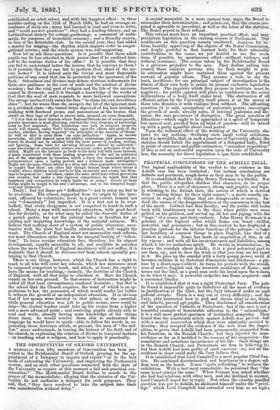THE OBSTRUCTIVES OF OXFORD UNIVERSITY.
AoaiAL from fifty members of Convocation has been pre- sented to the Hebdomadal Board of Oxford, praying for the ap- pointment of a Delegacy to inquire and report " as to the best mode of extending the University, and improving the Professorial system, and on such other questions connected with the state of the University as require at this moment a full and practical con- sideration." The Hebdomadal Board decline to accede to the prayer of the memorialists ; alleging that the statutes of the Uni- versity do not authorize a delegacy for such purposes. They add, that " they have resolved to take the subject into their own consideration without delay." A second memorial, in a more earnest' tone, urges the Board to reconsider their determination ; and points out, that the course pro- posed is agreeable to precedent, as well as the letter of the statutes. The Board persist in their refusal. This refusal must have an important practical effect, and may precipitate legislation in the ensuing session of Parliament. Our sentiments on this question remain unaltered. Anxious for re- form, heartily approving of the objects of the Royal Commission, and deeply grateful to that learned body for their admirable contributions to the cause, we yet desired to see the work done, if possible, by spontaneous effort—without violence, and without resistance. The course taken by the Hebdomadal Board is a grievous prejudice to the ease. They decline calling into council those eminent persons who by their weight in pub- lic estimation might have sustained them against the present current of popular odium. They assume a task, to say the least, invidious ; for one principal subject of investigation is the fitness of their own body to retain its present exclusive legislative functions. The inquiries which they propose to institute must be nugatory ; for public opinion will place no confidence in the secret deliberations of a body itself under trial. The obstruction of all efficient action by the University itself places it at the mercy of those who threaten it with violence from without. The affronting assertion (it is said, usurpation) of autocratic power, encourages the growth of seeds, already sown, of internal jealousies and dis- union, the sure precursors of disruption. The great question of Education—which ought to be approached in a spirit of temperate but earnest zeal, purified from all taint of passion—will be mixed up with a party squabble about local power.
Upon the technical effect of the wording of the University sta- tutes we say nothing—declining such small verbal criticisms. But it is incredible, that, in such a puncture of University affairs, the statutes should forbid the appointment of a delegated-body, fitted in point of eminence and public estimation, " consulere reipublicte." If this is not an unfounded aspersion upon the code of University law, the necessity for direct legislation is ipso facto established.


























 Previous page
Previous page